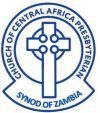
if Zambia was your home, 60% of your neighbors would be living below the poverty line and 42% of those people would be living in extreme poverty. However, even though poverty is a daily reality for the majority of people in Zambia, most people are deprived of the tools to end the cycle of poverty. For example, most of the people in Zambia have been deprived of an education that would give them a higher standard of living. In rural areas of the country, the average adult male has a 6th grade education and the average adult female has a 3rd grade education. Unicef reports that 72% of children in Zambia attend primary school but only 46% of children attend secondary school. Also, 52% of Zambia’s population is under the age of 18, making the demand for adequate and accessible education incredibly high.
In partnership with the Ministry of Education, the CCAP Synod of Zambia’s Education Department addresses the issue of poverty by providing children an education they wouldn’t have received otherwise. Before Zambian independence, Scottish missionaries built 70 CCAP primary schools in northeastern Zambia. These schools were confiscated from the missionaries by the colonial government but, in 2003, the CCAP Synod of Zambia reclaimed 11 of those schools. With the help of the Ministry of Education, the CCAP mission schools are provided with trained teachers, if teacher housing is available, and up to date curriculum. The Education Department currently oversees 18 primary schools and 7 secondary schools, a total of 14,000 students. The CCAP mission schools have attained impressive national exam results and provide its students quality education and a Christian-oriented, inclusive, interactive, and engaging school environment.
The Education Department not only provides children with an education via its mission schools but the department also has several programs that supplement the students’ education. For example, the Teaching for Transformation Program organizes head teachers and deputy head teachers every year from late January to early February to train them on how to teach the word of God in their schools. The Teaching for Transformation program also runs the Mbeu Deo “Seed of God” Program, which recruits teachers in college and encourages them to not only work in CCAP schools but also integrate the word of God into the school curriculum. There’s also the Friends of CCAP Education Department Program where individual donors can help CCAP schools by buying or donating school materials. The department also runs an Orphaned and Vulnerable Children (OVC) Support Program that focuses on supporting children who have either lost one or both parents, are HIV positive, or whose families do not have the financial means to send their children to school. Finally, the department organizes a Chaplaincy Program, which offers pastoral care in the mission schools. Currently, the mission schools cannot afford full-time chaplains so pastors are assigned to schools that fall under their presbytery or congregation.
The coordinator of the Education Department, Mr Collins Nyirenda, states that one of the greatest successes of the CCAP schools is that some of the students who attended CCAP schools became teachers because of the education they received. Mr Collins Nyirenda remarks that “there is a teacher who received his education through the CCAP schools through the Orphaned and Vulnerable Children Support Program. To this day, the man says ‘I don’t know what I would have done if God had not given me CCAP schools. I am a teacher now because of CCAP schools.’”
Status: The Education Department is financially supported by: EduDeo Ministries (Canada), Solon Foundation (Switzerland), and World Servants (Netherlands)
The Education Department is currently focusing on infrastructure development, which includes teacher houses, science laboratories (shown above), and hostels for female students. Hostels for female students are especially important at secondary schools because some girls must travel long distances to school.
